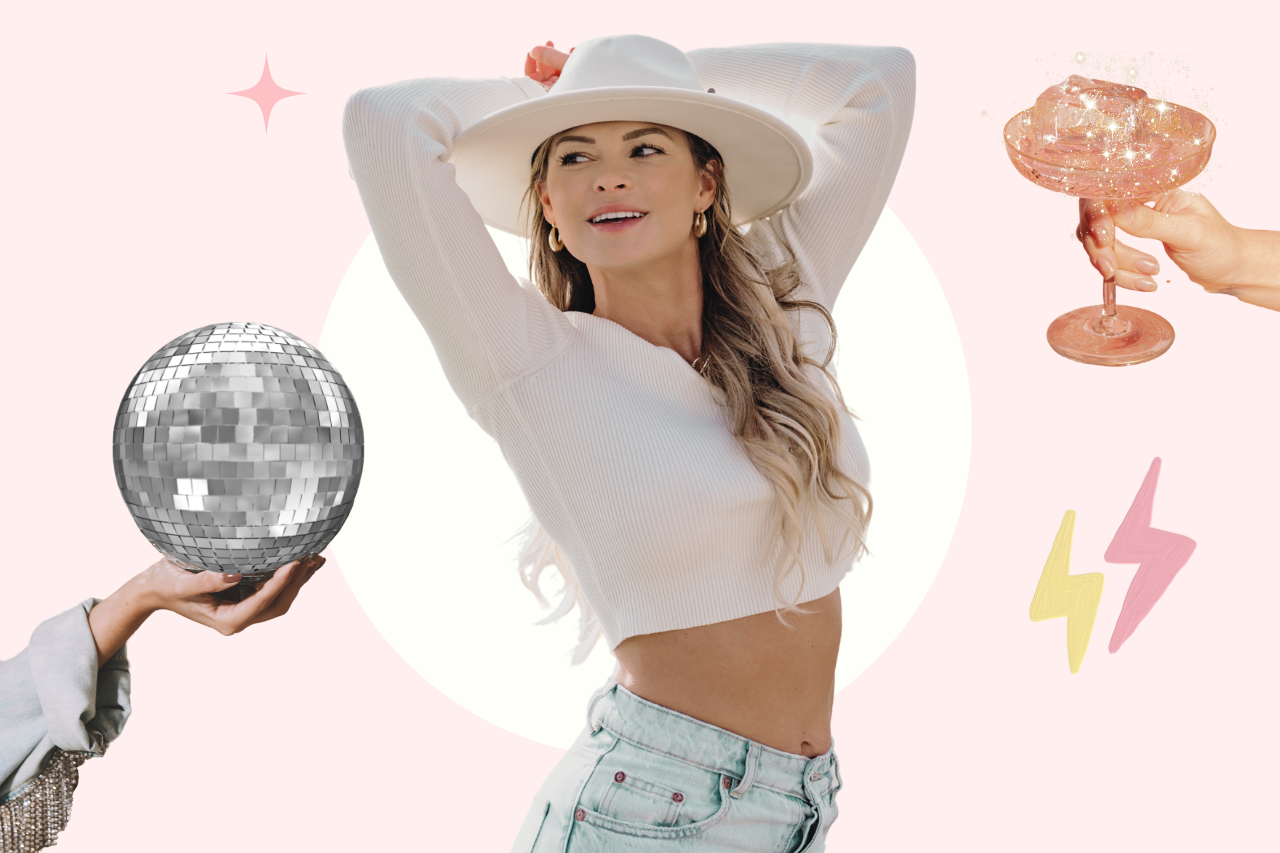
Let’s be real: We all feel a bit blah during this time of year. The cold, dreary weather can seriously bring your vibe down, and studies have shown that lack of sunlight makes humans more sleepy. When you combine that with the holiday overindulgence aftermath, it’s unsurprising that this time of year can make you feel less than great. This is one of the reasons why more and more people are doing Dry January—a wellness trend that challenges individuals to refrain from consuming booze for one month.
Sober curious fitness coach Kathryn Sauser describes Dry January as a “great way to kick-start a healthier relationship with alcohol and explore how it’s affecting all areas of our lives.” Sauser has been drug and alcohol free for nearly three years now and is a huge advocate for Dry January and the sober curious movement.
That said, the idea of going sober for a month can seem daunting. As someone whose grandmother had a glass of champagne every night, worked every day, lived on her own and drove a Mercedes until she passed away at 87, I’ve always been a huge fan of balance.
However, according to Kathryn Sauser, Dry January is worth it, and doing it can be an empowering and enlightening experience. Regardless of your health goals, Sauser believes everyone can benefit from taking on this challenge. Keep scrolling to learn why you should consider doing Dry January, the benefits of sober living, and Sauser’s tips for successfully taking on the challenge.
Why you should consider doing Dry January:

MEET THE EXPERT
Kathryn Sauser
SOBER CURIOUS LIFESTYLE COACH, CERTIFIED NUTRITIONIST AND ONLINE FITNESS COACH AT KATHRYNSAUSER.COM
Why You Should Do Dry January
By now, you’ve probably heard of the “sober curious” movement a growing number of public figures have been touting. Sauser says that this movement encourages individuals to take a look at their relationship with alcohol and explore what could be if they decided to live differently by reducing their alcohol intake or removing it from their life altogether.
Participating in Dry January is a great way to re-examine your drinking habits. “Abstaining from drinking for a month can give you a good perspective on the impact alcohol has in your life and the role that it plays in your decisions,” she said. This can be helpful for self-growth and gives you the chance to recognize unhealthy behaviors and make changes accordingly.
This sentiment also goes for those who don’t want to participate in Dry January. “Taking time to reflect on how much you drink, when you drink, why you drink, and becoming aware of what happens when you drink can help you identify the role alcohol plays in your life,” she told me. “Taking the time to do this means recognizing that sometimes we may have to put down the bottle and choose something different; it can be that simple.”

The Benefits of Sober Living
Since Sauser has been sober for almost three years now, I asked her what the biggest benefits of sober living are. These are her answers in her exact and own words:
1. The mental benefits
Kathryn Sauser: “Alcohol can be used as a way of masking or avoiding uncomfortable emotions, but decreasing or quitting drinking can reduce stress and improve your overall well-being. Living a sober lifestyle (I always suggest with support) can provide you with the skills needed to deal with difficult situations without relying on substances. Having the tools to understand and accept our feelings can help us build more balanced relationships with ourselves and loved ones.
Even if you’re not in recovery or struggling with an addiction, many people—including myself—feel more energized, productive, and focused abstaining from drinking. What took me months to complete before now only takes me a few days. There was so much time that went into my drinking. Getting ready, drinking, staying out late, not sleeping, hungover, anxiety for days. You could do so much more with this time.”
2. The physical benefits
Kathryn Sauser: “One of the main physical benefits of sober living is weight loss. I’m an Online Fitness Coach, WBFF Bodybuilding Pro, and certified Nutritionist, so my relationship with my body is a huge part of my sobriety. Alcoholic drinks are loaded with calories, which takes you further away from your weight loss goals. These drinks mostly have little to no nutritional value or ’empty calories,’ which means that they don’t even supply the healthy nutrition to your body and just get stored. Most drinks also have well over 200 calories per drink, which means only a couple of drinks can add up to a thousand calories to your daily intake.
Your skin can also benefit from sobriety. Excessive drinking can cause dehydration, leading to dull and dry skin. By cutting out alcohol, you can allow your skin to glow with improved hydration and balance. In addition, research has suggested that heavy drinking can increase the likelihood of developing thinning hair or baldness. If you want to keep your hair looking luscious and full, ditching the booze could be the answer.”
3. Better sleep & gut health
Kathryn Sauser: “Better sleep is another great benefit of sobriety. Drinking before bed can interfere with sleep cycles and cause restlessness throughout the night. If you go to bed sober, though, you’re more likely to fall into a deeper, restorative sleep.
Finally, your digestion system will thank you for going dry. Alcohol consumption can disrupt digestion, leading to bloating, gas, and other digestive issues. Reaping the rewards of sobriety will help keep your digestive system in check.”
4. More meaningful relationships
Kathryn Sauser: “I was living in a vicious cycle of binge-drinking, then feeling guilty and ashamed; this was certainly hurting areas of my life. It looked like this: I got drunk—blackout drunk—and kept seeking pleasure to avoid pain; I would go out and spend hundreds of dollars on food and drinks, only for the story to stay the same and worsen. The drink always brought its painful consequences: Wake up feeling like sh*t, hate myself, spend days stuck in the house feeling sorry for myself binge-eating, repeat. This caused intense, unbearable anxiety.
This is a special kind of hell I wish upon no one. When you rely on alcohol or food to cope with stress and anxiety, it can have a negative impact on your relationships, physical and mental health and overall well-being. It can also lead to feelings of guilt and shame that prevent you from enjoying life to the fullest and reaching your goals.
This cycle can be especially damaging when it leads to procrastination and perfectionism. These habits can sabotage your efforts and keep you from achieving success. They can also cause you to become overwhelmed, leading to further procrastination, more guilt, and more shame.”

How to successfully take on Dry January
Taking on Dry January can be intimidating, but it doesn’t have to be. In fact, Sauser swears that only good can come from it; and with her expert-backed tips, you can successfully take on the challenge or explore sober curiosity like a pro.
1. Establish a strong support system
Sauser swears by surrounding yourself with people who can provide you with encouragement and guidance throughout the month. This could come in the form of friends, family, co-workers, a support group of like-minded people or a professional coach. She also stressed the importance of removing anything from your life that could potentially hold you back, and replacing old habits with newer, healthier ones.
2. Aim for progressive perfection
“It’s important to remember that if you do have a drink, don’t just throw in the towel and give up,” Sauser told me. She also said that self-compassion is key. “Strive for progressive perfection, where you recognize each slip-up as an opportunity to learn and come back stronger.”
3. Embrace your emotions
Sauser also said that you should be ready for uncomfortable emotions to pop up when you remove alcohol from your life. “For many people, alcohol can be a symptom or a tool they use to cover up or ease social anxiety,” she said. “When you remove it, it isn’t always pure freedom. From my experience, it can be helpful to embrace any emotion that comes up and look at it as an opportunity for growth.”
4. Follow Kathryn Sauser’s 5-Step Sober Conscious Fitness Method
Lastly, Sauser also recommends following her 5-step Sober Conscious Fitness Method. She swears that following these 5 steps will give you a boozeless, happy, and healthy life.
- Identify your why. Why do you want to reduce or stop drinking? Is it for your career, family, or health? What happens if you don’t make this change? – having this list in your notepad in social situations helps you play the tape forward and remember why you started!
- Build an unshakable foundation. Confront triggering situations head-on. Once you’re there, don’t drink the pain away; instead, make decisions that support your mind and body.
- Break through limiting beliefs and fears. Discover how you can drink less or not at all. Become aware of the negative habits and beliefs holding you back from having the positive changes in your life you desire.
- Forgive yourself of any drinking shame. Stop living in the past—you can’t move forward if you’re still there.
- Step into your new, empowered self and create healthy boundaries. Have support and accountability to help you get back on track through the good and the bad.



Great ideas heading into a new year. I’ve heard great things about dry January- and this post really helps answer some of my questions on the idea. Thanks for sharing!
Author
Same here! Kathryn’s insight was invaluable on that front – the benefits of exploring sober curiosity for a month and challenging yourself to do Dry January are definitely enticing. Thanks for reading!
Honestly never considered doing this before purely because I hardly ever drink anyway but I definitely can see the benefits for anyone!
Author
Totally; exploring sober curiosity is something everyone can benefit from! Thanks for reading!
It is so interesting that this morning on Fox News the term dry January was mentioned, but did not truly understand it until I read your blog. I am not a drinker, but I appreciate the health benefits of going dry fast in January.
Author
It’s a term I’ve heard for a while as well but had never heard it broken down the way Kathryn did. And she made the benefits sound incredibly enticing! Thanks for reading!
Great ideas and tips , thank you for sharing
Author
Thank you so much!